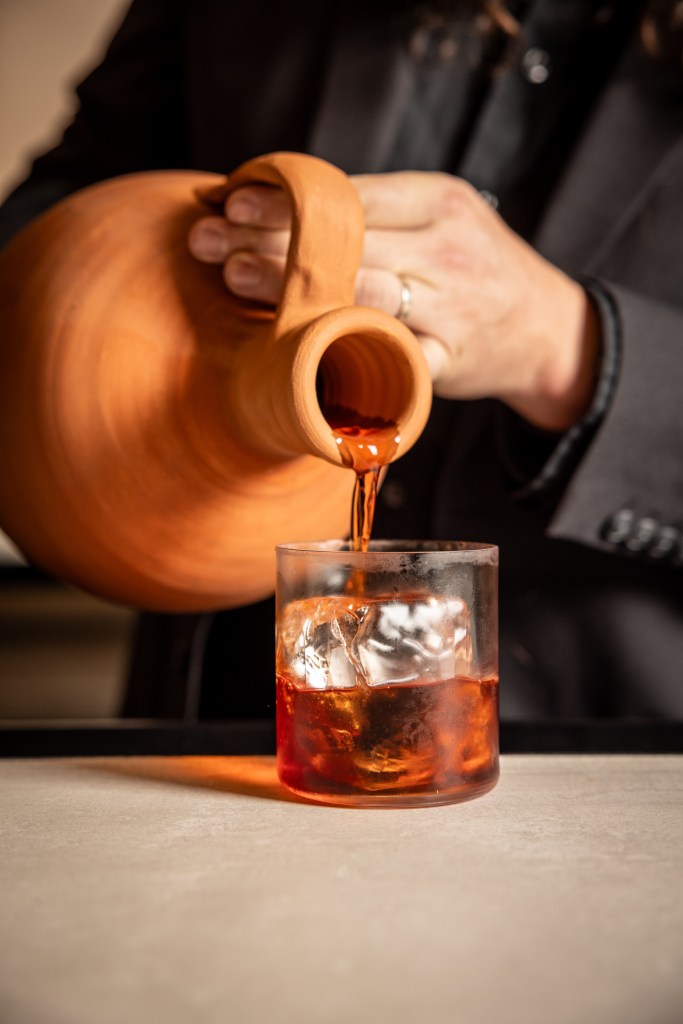Hospitality. It’s a word I hear over and over (and over) throughout my conversations with three of the four co-owners of the new Boatman Spirits Co., a cocktail bar and restaurant that opens June 13 in the revamped Seaboard Station in Raleigh.
What does hospitality mean, exactly? I ask the question, feeling at first like I’m just getting a buzzword. After all, doesn’t every bar want to provide good hospitality so that guests feel welcome and have a great experience?
“I think since COVID, the lack of hospitality and customer service has become painful,” says co-owner George Ghneim, a veterinarian, epidemiologist, and former restaurateur—who also owns four Oak Heart Veterinary Hospitals and Wake Veterinary Medical Center—of the problem they’re trying to address. “I want us to have a reputation for a really high-quality environment, high-quality ingredients, and high-quality products.”
“There are many bars that I’ll go to and I’ll sit at the bar and the only conversations I’ll have are ‘What can I get you?’ and ‘Can I get the check for you?’” adds co-owner and local bartending favorite Zack Thomas, who formerly managed and bartended at Foundation and The Crunkleton in Chapel Hill.
The space itself is vast, at a total of 7,000 square feet. The 96-seat dining room takes up 4,000 of that square footage, while a 3,000-square-foot distillery is proximate through a large glass window. The menu will focus on Mediterranean street food and include dishes like grilled Halloumi, za’atar chicken wings, and a lamb kofta burger.
As I listen, the Boatman co-owners start to walk me through their playbook for how they aim to deliver on better hospitality—a two-pronged approach that focuses on patrons and employees.
Prichard. Photo by Forrest Mason.
Subtle details foster a great customer experience, like a detailed cocktail menu that’s “going to provide way too much information for everything,” Thomas says with a laugh.
The menu is, in fact, quite extensive, with little blurbs underneath each cocktail to help describe how it’ll taste. I often waffle on whether to order a cocktail because I often don’t understand how the ingredients will work together and don’t want to risk not liking something. Having a description like this will help give folks like me clarity on what’s going to show up in their glass.

I land on the Obsequy cocktail, with vodka, fino sherry, and nukadoko peach in it. It’s described as being a “dirty martini hiding in the fuzz of a preserved peach,” which is an accurate description for the drink Thomas makes me. It’s alcohol forward, like a martini typically is, and it has just a hint of sweetness, which makes sense given the use of preserved peach versus fresh peach.
The cocktail menu is a carefully curated list that Thomas says he’s been working on for over a decade. Drinks are categorized into different sections, depending on how the base spirit is accentuated, says Thomas, moving from spirit-forward drinks to more “refined” options, all the way through to the nonalcoholic menu. One of the menu’s quirkier items is the Punch Romaine, a cocktail made with shaved ice, rum, white wine, and soda. It was the last drink served on the Titanic.
The long bar is made up of two bars in one, so that bartenders have everything they need close by, and Thomas has installed what he calls a “cockpit” to make drinks more quickly. It’s called the Tobin Cocktail Station, and when Thomas started using it at The Crunkleton, he says sales went up by 30 percent as a result.
The core strategy for delivering hospitality, though, the Boatman owners say, revolves around their employees.
“We feel like the avenue to good, proper service to a guest is through the folks that work for us,” Thomas explains. “Hospitality starts with how we pay our people.”

Dishwashers, as an example, earn $18-$20 out of the gate, even if they have no experience, co-owner and director of operations Aaron Lambert says. Bar professionals earn $10 an hour plus pooled tips. In addition to paying what the owners say are above-average rates for the restaurant industry, full-time employees will also get health benefits as well as paid time off, which Thomas says “is something that has not existed in our industry for a long time.”
These elements are necessary, Thomas says, because if you want people to see working in the industry as a career, they should get the same types of perks as people working in the corporate world.
Lambert saw firsthand how offering health benefits affected employee morale and turnover rates when he managed Whiskey Kitchen in downtown Raleigh. “When I left, more than 80 percent of my staff had been there with me since day one,” he says.
One of the other things that Boatman Spirits Co. will do differently is not marking a distinction between bartenders and servers. Thomas says they’ve hired bar professionals who will all work behind the bar as well as on the floor and who will all make the same amount of money.
“I want everybody to be good at everything at all times,” he stresses.
They say that a rising tide lifts all boats. Time will tell if the increased commitment to employees and thoughtful details for customers will lift the hospitality standards for Boatman, but it’s a strategy that makes a lot of sense conceptually.
“We really worked hard to think about how we can stand out, how we can be special, how we can be different,” says Ghneim. “So once you walk into Boatman, we want people to feel like they’ve gone to another world.”
To comment on this story, email [email protected].
